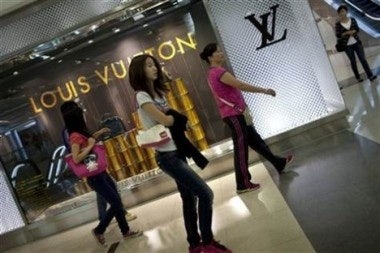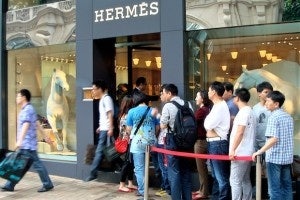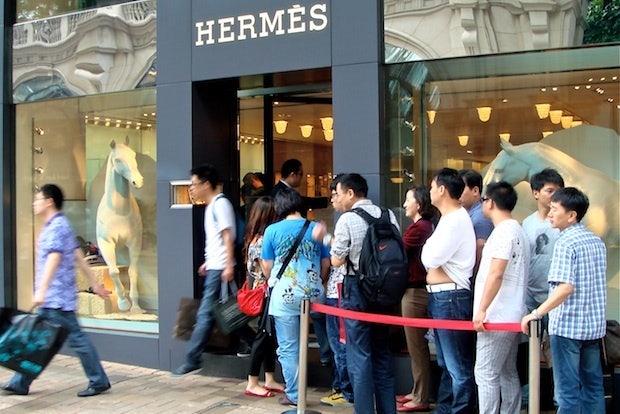Domestic luxury sales dropped to single digits last year, hit 31 percent growth overseas#

As Chinese tourists crammed into luxury boutiques in Europe and the US while domestic spending on high-end goods remained, relatively modest (with the exception of duty-free shops in Hainan) during China's Lunar New Year holiday, once again the official Chinese press has brought up the issue of luxury tax reform. A regular (and controversial) topic in Beijing, policymakers in the Ministries of Finance and Commerce have been engaged in a tug-of-war over the question of lowering China's stiff import taxes on luxury items for years now with no clear end in sight. Yet as Beijing dithers, Chinese shoppers continue to make more than half of their luxury purchases overseas, and as Xinhua notes this week, reforms to spur domestic consumption can't come soon enough for luxury retailers in mainland China:
Policy makers in China have reacted slowly to the growing spending power of Chinese consumers. Media reports estimate that Chinese spent $85 billion overseas in 2012, with a notable portion going toward top-notch goods such as watches, handbags, jewelry and clothing.
However, the growth rate of China's luxury goods market fell from 30 percent in 2011 to just 7 percent in 2012, according to estimates from Bain Capital, one of the world's leading private, alternative asset management firms, which also estimates that Chinese consumer spending overseas increased 31 percent in the same period.
Chinese consumers' spending on luxury goods will continue to rise, even if it's not at home, according to consultancy McKinsey. China will account for one-third of the 175 billion-US dollar global luxury goods market by 2015, up from 27 percent of the 145 billion-US dollar market in 2012, it said in a report released in December.
These are numbers no government can afford to neglect.
Though it's significant that Xinhua is advocating the government finally move on luxury tax reform, we've heard this all before and virtually nothing has been done. Two long years ago, at the 2011 National People’s Congress (两会), Dalian Wanda Group chairman Wang Jianlin (王建林) and others called out to the Chinese government to reduce import duties, saying high luxury taxes inhibit job growth and decrease tax revenue, as “Chinese people sit on airplanes to deliver jobs and tax money to foreign countries.” In the months that followed, signs indicated that Beijing was listening to growing calls to abolish or lower its luxury tax code. By June 2011, Ministry of Commerce spokesman Yao Jian sought to inject himself into the debate, saying, “the direction [the government] will take is to further reduce import tariffs on middle- and high-end products.”

By October of that year, though, little had been done. Instead of moving quickly to cut luxury taxes, bureaucrats in Beijing had busied themselves trying to pin down the exact meaning of the word “luxury.” As Lu Peijun, deputy head of the General Administration of Customs, told China Daily at the time, “Tariff cuts are an issue of the top priority with policymakers. However, the definition of luxury products should be made more accurate to better delineate tariff policies.” Along with semantic roadblocks, another reason given by analysts for Beijing’s slow moves was infighting between the Ministries of Finance and Commerce on what should be done. While the Ministry of Commerce strongly supports tariff cuts to spur more Chinese consumers to shop domestically, China Daily noted that the Ministry of Finance opposes the cuts. And in typically opaque fashion, Shen Danyang, a spokesman for the Ministry of Commerce, said that “it’s unclear whether the two ministries have reached a consensus.”
By the end of 2011, after months of wrangling, the only progress seen on the luxury tax reduction was a vague assurance by Beijing that import taxes would be reduced for 730 consumer products, including high-end cosmetics, cigarettes and liquor. However, as Jing Daily pointed out last year, those moves had little effect, as price increases of anywhere from 5-15 percent by the brands themselves have outpaced tax reductions (which averaged a weak 4.4 percent). Throughout 2012, despite lip service paid to the issue very little progress was made, and with luxury something of a four-letter-word in Beijing at the moment, we're unlikely to see any high-profile governmental moves on the issue this year either.
